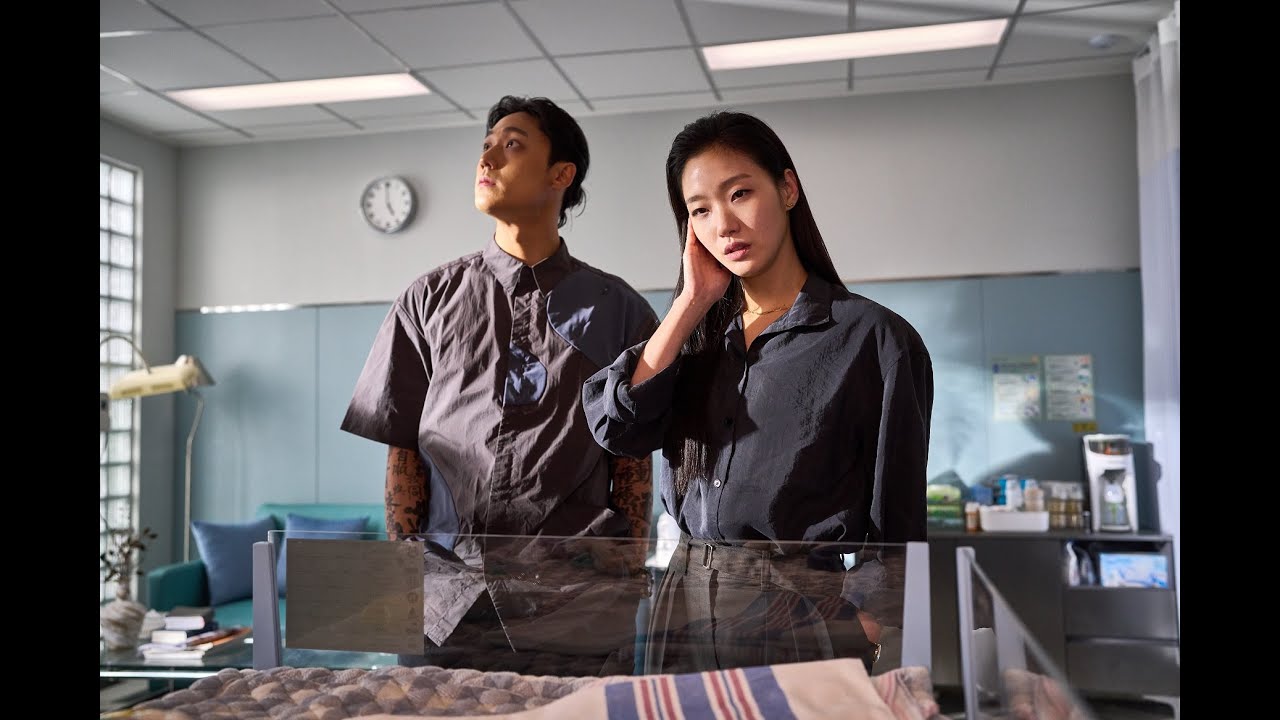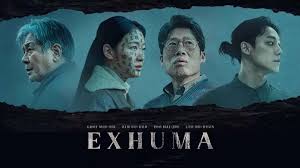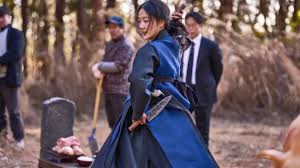🎬 Exhuma (2024)

Exhuma (2024) Review: A Haunting Exploration of Korean Shamanism and Supernatural Horror
Introduction
Horror cinema has always been a fascinating space where cultural myths, folklore, and psychological terror converge to create an immersive experience. Exhuma (2024), directed by Jang Jae-hyun, is a perfect example of how South Korean cinema continues to innovate in the supernatural horror genre. Known for his work in films like The Priests and Svaha: The Sixth Finger, Jang once again brings audiences into the mysterious and eerie world of shamanism, exorcism, and the supernatural. Starring Choi Min-sik, Kim Go-eun, Yoo Hae-jin, and Lee Do-hyun, Exhuma is a film that blends traditional Korean burial practices with modern-day horror, creating a gripping and terrifying story that lingers in the mind long after the credits roll.
Plot Summary
The story revolves around a group of individuals who become entangled in a mysterious and terrifying case. A skilled geomancer (played by Choi Min-sik), a shaman duo (Kim Go-eun and Yoo Hae-jin), and a meticulous undertaker (Lee Do-hyun) are called upon to exhume a grave that has been sealed for generations. What initially seems like a routine job quickly takes a dark turn as they uncover an ominous presence that refuses to be disturbed.
As they proceed with the exhumation, supernatural occurrences escalate, and the team finds themselves battling forces beyond their understanding. Strange visions, unexplainable deaths, and malevolent spirits torment them, forcing them to confront the horrifying consequences of their actions. With each revelation, they realize that the grave was never meant to be opened, and something ancient and vengeful has been awakened.
Thematic Depth and Cultural Significance
1. Korean Shamanism and Geomancy in Horror
Exhuma intricately weaves elements of Korean shamanism (muism), burial rites, and geomancy (pungsu-jiri) into its narrative. Shamanism has long been a part of Korean culture, where shamans (mudang) serve as intermediaries between the human and spirit worlds. The film uses this belief system to craft an authentic supernatural horror experience, making it deeply rooted in Korean tradition rather than relying on Western horror tropes.
Geomancy, or the art of divining auspicious burial sites, plays a crucial role in the film. According to Korean folklore, disturbing a grave located in a cursed or spiritually charged area can have devastating consequences. Exhuma capitalizes on this belief, using it as a narrative device to create an atmosphere of impending doom and inevitable disaster.
2. The Consequences of Disturbing the Dead
One of the film’s central themes is the idea that the dead should not be disturbed. Many cultures around the world hold strong beliefs about respecting the resting places of the deceased, and Exhuma explores what happens when this boundary is broken. The act of exhumation is not just a physical process—it is a disruption of spiritual balance, inviting consequences that go beyond human comprehension.
The film uses this theme to build tension and fear, showing how each character is affected by their decision to disturb the grave. Their descent into horror is not just external but psychological, as they struggle with guilt, fear, and the realization that they have made a grave mistake.
3. Supernatural Horror vs. Psychological Terror
While Exhuma is a supernatural horror film, it also excels in psychological horror. The characters are not only tormented by spirits but also by their own fears and regrets. As the film progresses, it becomes clear that the horror is not just about ghosts and curses but also about the human psyche’s response to the unknown.
The film effectively uses sound design, lighting, and cinematography to create an unsettling experience. Dark, shadowy visuals combined with eerie silence and sudden, jarring noises keep audiences on edge, making every scene feel unpredictable and terrifying.
Character Performances and Development
1. Choi Min-sik as the Geomancer
Veteran actor Choi Min-sik, known for his iconic role in Oldboy, delivers a powerful performance as the geomancer. His character is portrayed as someone who possesses deep knowledge of traditional burial practices but is also burdened by past experiences. As the story unfolds, his skepticism turns into fear, and his arc is one of the most compelling in the film.
2. Kim Go-eun as the Shaman
Kim Go-eun, known for Goblin and Tune in for Love, plays a young yet talented shaman. Her character is confident yet vulnerable, making her both relatable and intriguing. As the events spiral out of control, her performance captures the sheer terror and desperation of someone who realizes they are dealing with forces beyond their control.
3. Yoo Hae-jin as the Veteran Shaman
Yoo Hae-jin, a seasoned actor with experience in both comedy and drama, adds a layer of authenticity to the film. His character, a seasoned shaman, provides much-needed exposition on the rituals and practices involved in the exhumation. However, as the terror unfolds, his calm demeanor begins to crack, making his character arc particularly compelling.
4. Lee Do-hyun as the Undertaker
Lee Do-hyun, a rising star in Korean cinema, plays the undertaker responsible for the exhumation. His role is crucial as he is the one directly involved in the act of disturbing the grave. His transformation from a confident, logical professional to a terrified, haunted individual is one of the most dramatic in the film.
Cinematography, Sound Design, and Special Effects
1. Atmospheric Cinematography
The cinematography in Exhuma is a standout feature, with dark, shadow-heavy visuals that create an eerie atmosphere. The use of dim lighting and narrow spaces enhances the feeling of claustrophobia and helplessness. Long, lingering shots build suspense, while sudden close-ups amplify the terror of the characters’ expressions.
2. Haunting Sound Design
Sound plays a crucial role in horror films, and Exhuma is no exception. The film’s sound design uses whispers, distant wails, and sudden silences to create an unsettling atmosphere. The lack of a traditional horror soundtrack in key moments makes the experience even more intense, as the natural sounds of wind, rustling leaves, and echoing footsteps take center stage.
3. Practical and Digital Effects
The film combines practical effects with CGI to create realistic and terrifying supernatural encounters. Instead of relying solely on jump scares, Exhuma employs slow-building horror, using subtle visual distortions and eerie apparitions to keep audiences on edge.
Final Verdict: Why Exhuma Stands Out
Exhuma (2024) is a testament to South Korea’s mastery of the horror genre. Unlike typical Hollywood horror films that rely heavily on predictable jump scares, Exhuma builds an immersive world where the fear is deeply ingrained in cultural and spiritual beliefs. The film’s strength lies in its ability to make the supernatural feel real, forcing audiences to question the boundary between the living and the dead.
With outstanding performances from its cast, breathtaking cinematography, and an intelligent script that delves into themes of spirituality, guilt, and the consequences of disturbing the past, Exhuma is a must-watch for horror enthusiasts. It’s a film that lingers in the mind, making viewers reflect on the unseen forces that may exist around us.
Rating: 4.5/5
Final Thoughts
If you are a fan of supernatural horror films that offer more than just surface-level scares, Exhuma is a perfect choice. With its rich cultural backdrop, compelling characters, and terrifying atmosphere, this film cements its place as one of the best horror movies of 2024.
#Exhuma #KoreanHorror #SupernaturalThriller #Shamanism #FolkloreHorror #KimGoEun #ChoiMinSik #HorrorMovies